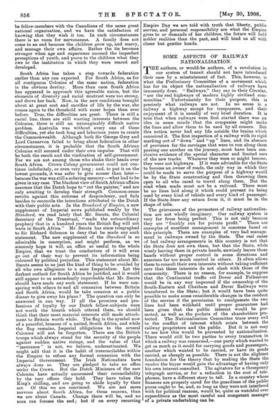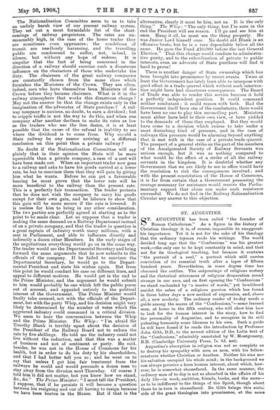SOME ASPECTS OF RAILWAY NATIONALISATION. T HE authors, or would-be authors,
of a revolution in our system of transit should not have introduced their case by a misstatement of fact. This, however, is what the Preliminary Committee of a movement which has for its object the nationalisation of railways have innocently done. "Railways," they say in their Circular, "are the real highways of modern highly civilised com- munities." Unfortunately for their purpose, this is precisely what railways are not. In no sense is a railway a highway except for trespassers, and their enjoyment of it is usually of very brief duration. It is true that when railways were first started there was an idea in some minds that the companies might make the lines and allow them to be used by all comers. But this notion never had any life outside the brains which conceived it. The first inspection of a railway with its rigid marking out of " down " and " up " lines, and its absence of provision for the carriages that were to run along them passing one another on the journey, must have been con- clusive evidence of the special character and limited uses of the new tracks. Whatever they were or might become, they were not highways. If it were advisable for the State to become an owner of roads, the only way in which they could be made to serve the purpose of a highway would be by the State constructing and then throwing them open to all who cared to travel along them. But the road when made must not be a railroad. There must be no lines laid along it which could prevent its being used by every kind of vehicle and every kind of passenger. If the State drew any return from it, it must be in the shape of tolls.
The grievances of the promoters of railway nationalisa- tion are not wholly imaginary. Our railway system is very far from being perfect. This is not only because they are "frankly run for private profit." 'There are examples of excellent management in concerns based on this principle. There are examples of very bad manage- ment in railways owned by the State. The real cause of bad railway arrangements in this country is not that the State does not own them, but that the State, while wisely leaving them in private hands, unwisely leaves those hands without proper control in some directions and exercises far too much control in others. It often allows them to consult their own interests without taking sufficient care that these interests do not clash with those of the community. There is no reason, for example, to suppose that the Continental traffic vid Dover and Folkestone would be in any way improved if the ownership of the South-Eastern and Chatham and Dover Railways were transferred to the State; but it would have been quite possible to make some considerable changes in the conduct of the service if the permission to amalgamate the two lines had been withheld until proper guarantees had been given that the public interest would be pro- moted, as well as the pockets of the shareholders pro- tected. The Nationalisation Committee trace every evil to the conflict of interest which exists between the railway proprietors and the public. But it is not easy to see how this would be prevented by nationalisation. There would still be two parties to every transaction in which a railway was concerned,—one party which wanted to get as much as it could for carrying goods and passengers, another which wanted to be carried, or have its goods carried, as cheaply as possible. There is not the slightest foundation for the theory that by making the State the vendor the buyer would gain the advantage of having only his own interest consulted. The agitators for a threepenny telegraph service, or for a reduction in the cost of tele- phones, have a different story to tell. In a country whose finances are properly cared for the guardians of the public purse ought to be, and, so long as they were not interfered with for political reasons, would be, quite as watchful over expenditure as the most careful and competent manager of a private undertaking can be. The Nationalisation Committee seem to us to take an unduly harsh view of our present railway system. They set out a most formidable list of the short. comings of railway proprietors. The rates are un- reasonably high, in the case of the home trader they are sometimes even oppressive ; the conditions of transit are needlessly harassing, and the travelling public are condemned to suffer, not, indeed, in silence, but without any hope of redress. It is singular that the fact of being concerned in the direction of a railway should exercise such a disastrous influence on the characters of those who undertake the duty. The chairmen of the great railway companies are constantly chosen from the same class which furnishes the Ministers of the Crown. They are often, indeed, men who have themselves been Ministers of the Crown before they became chairmen. What is it in the railway atmosphere that works this disastrous change:? May not the answer be that the change exists only in the imagination of the advocates of State purchase ? A rail- way company is anxious, no doubt, to earn a dividend; but to cripple traffic is not the way to do this, and when one company after another declines to make its rates as low as the traders who use the line desire, it is at least possible that the cause of the refusal is inability to see where the dividend is to come from. Why should a State railway be any nearer arriving at a different conclusion on this point than a private railway ?
No doubt if the Nationalisation Committee will say plainly that in their opinion the State will be more squeezable than a private company, a case of a sort will have been made out. When an important trader now goes to a railway and asks to have his goods carried at a lower rate, he has to convince them that they will gain by giving him what he wants. Before he can get a favourable hearing he must prove that the lower rate will be more beneficial to the railway than the present rate. This is a perfectly fair transaction. The trader protests that he does not wish the company to carry his goods except for their own gain, and he labours to show that this gain will be more secure if the rate is lowered. It is useless for him to bring in any other consideration. The two parties are perfectly agreed at starting as to the point to be made clear. Let us suppose that a trader is making the same demand on a Railway Department instead of on a private company, and that the trader in question is a great captain of industry worth many millions, with a seat in Parliament, and able to influence directly and indirectly a dozen other Members. In the early stages of the negotiations everything would go on in the same way. The trader would see the Departmental Secretary and bring forward the same arguments that he now submits to the officials of the company. If he failed to convince the Departmental Secretary, he would go to the Depart- mental President and state his wishes again. But from this point he would conduct his case on different lines, and appeal to different motives. He would get in the end to the Prime Minister, and the argument he would submit to him would probably be one which left the public purse out of account, and appealed entirely to the political interest of the Government. The Prime Minister would finally take counsel, not with the officials of the Depart- ment, but with the party Whip, and his decision might very likely be determined by the number of votes which the aggrieved industry could command in a critical division. We seem to hear the conversation between the Whip and the Prime Minister. The Whip : "I'm afraid Sir Timothy Blank is terribly upset about the decision of the President of the Railway Board not to reduce the rate by five shillings. He told me the industry could not live without the reduction, and that this was a matter of business and not of sentiment or party. He said, besides, he was not in the House of Commons for his health, but in order to do his duty by his shareholders, and that I had better tell you so ; and he went on to say that unless I got him fair treatment from the railways he could and would persuade a dozen men to stay away from the division next Thursday. Of course I told him it did not matter, but you know how we stand, &e., &c." The Prime Minister : "I must tell the President, I suppose, that if he persists it will become a question between his resigning and our all having to resign because we have been beaten in the House. But if that is the alternative, clearly it must be him, not us. It is the only thing." The Whip : "The only thing, but I'm sure in the end the President will see reason. I'll go and see him at once. Hang it all, he must see the thing properly. He was Junior Lord himself once. No doubt old Blank is an offensive brute, but he is a very dependable fellow all the same. He gave the Fund £10,000 before the last General Election." That this change would conduce to administra- tive purity, and to the subordination of private to public interests, even an advocate of State purchase will find it hard to provel
There is another danger of State ownership which has been brought into prominence by recent events. Twice at least the Government has lately been able to interpose with good effect in a trade quarrel which without such interven- tion might have had disastrous consequences. The Board of Trade was able to render this service because it held a perfectly independent position. It could command neither combatant ; it could reason with both. Had the Government itself been one of the combatants, there would have been no one to play this reconciling part. Ministers must either have held to their own view, or have yielded to the demands of those they employed. But they would have come to a decision which course to take under a most disturbing kind of pressure, and in the case of railways this pressure would be alarming beyond anything that is met with in the case of a private trade quarrel. The prospect of a general strike on the part of the members of the Amalgamated Society of Railway Servants was serious enough, but it was as nothing compared to what would be the effect of a strike of all the railway servants in the kingdom. It is doubtful whether any Government that we are likely to see in office would have the resolution to risk the consequences involved ; and with the present constitution of the House of Commons, it is far from certain that a Government possessing the courage necessary for resistance would receive the Parlia- mentary support that alone can make such resistance successful. We do not find in the Railway Nationalisation Circular any answer to this objection.







































 Previous page
Previous page